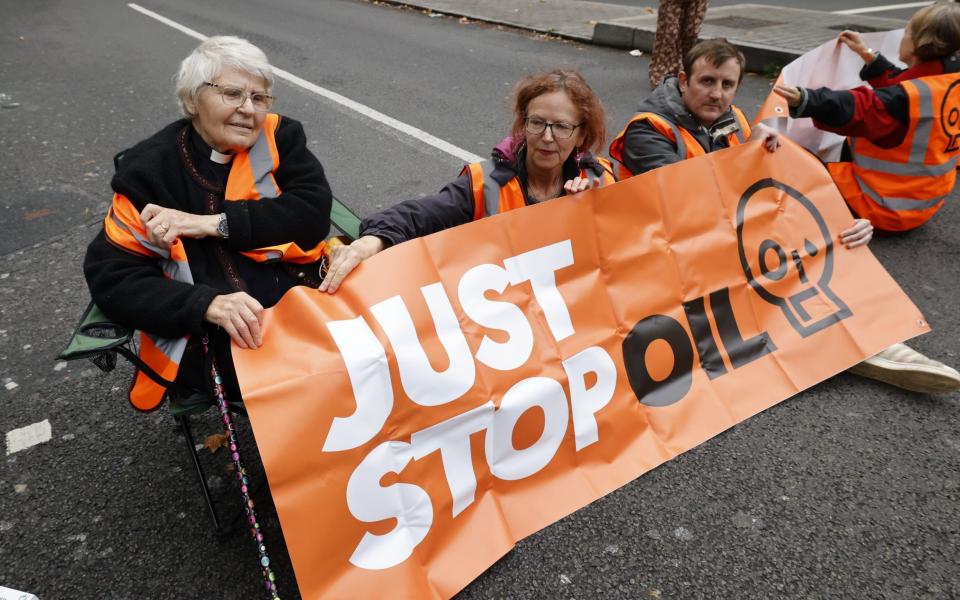Home Office protest rules are unlawful, says High Court

The Home Office decision to lower the threshold for police intervention in protests was unlawful, the High Court has ruled.
Liberty, the civil liberties group, launched a legal challenge against the Government over the regulations, which were passed last year.
The legislation, introduced under Suella Braverman, the former home secretary, following a wave of Just Stop Oil protests, gave officers more powers to prevent disruption.
The new regulations have seen hundreds of activists, including Greta Thunberg, arrested and brought before the courts.
But now, two judges have ruled that the law did not have a proper legal basis and the Home Office failed to consult properly on it.
The measures effectively lowered the threshold for what is considered “serious disruption” to community life, from “significant” and “prolonged” to “more than minor”.
They also allowed police officers to take into account “any relevant cumulative disruption” of repeated protests.
Government disappointed by outcome
A spokesman for the Prime Minister said that the Government “was obviously disappointed by the outcome”.
They added: “We’ve said before that the right to protest is fundamental to democracy, but we simply will not tolerate intimidation or serious disruption of the law-abiding majority.
“That is why we legislated to clarify the definition of serious disruption and give police the confidence they need to tackle serious disruption and tackle the scenes that we saw last summer where ambulances were being delayed and people’s lives were being disrupted.”
The regulations were passed using secondary legislation in June last year and were primarily aimed at tackling “slow march” protests and other disruptive actions.
The introduction of the powers was controversial, in part because the changes had already been rejected in the House of Lords six months before.
When the regulations were approved, Mrs Braverman argued the changes would provide “further clarity” for police.
At a hearing in February, lawyers for Liberty asked the High Court to quash the “unlawful” provision.
And in a ruling on Tuesday, two judges ruled for the group, finding the Home Office acted outside of its powers by reducing the threshold and failed to carry out a fair consultation process.
Consultation ‘one-sided’
Lord Justice Green and Mr Justice Kerr said: “As a matter of ordinary and natural language ‘more than minor’ is not within the scope of the word ‘serious’.”
The Court found that the consultation conducted by the Government prior to proposing this legislation was “one-sided and not fairly carried out”, and therefore also unlawful.
The Government had invited groups including policing bodies and the Crown Prosecution Service (CPS) but did not engage other parties that would be impacted such as community groups and protest groups.
The judges granted the Home Office permission to appeal against the ruling and said any challenge should be expedited.
The High Court has suspended the reversal of the measures until after the outcome of the appeal.
Ms Thunberg was charged under the powers in February for “failing to comply with a condition imposed under section 14 of the Public Order Act”.
She had been taking part in a protest outside the InterContinental hotel in Mayfair, the venue for the Energy Intelligence Forum (EIF), a fossil fuel industry summit attended by corporate executives and government ministers.
The case was thrown out by District Judge John Law due to “no evidence” of any offence being committed adding police attempted to impose “unlawful” conditions.
The judge said that the conditions imposed on protesters were “so unclear that it is unlawful”.
‘Huge victory for democracy’
Akiko Hart, Liberty’s director, said after the decision: “This ruling is a huge victory for democracy and sets down an important marker to show that the Government cannot step outside of the law to do whatever it wants.
“These dangerous powers were rejected by Parliament yet still sneaked through the back door with the clear intention of stopping protesters that the Government did not personally agree with, and were so vaguely worded that it meant that the police were given almost unlimited powers to shut down any other protest too.”
Speaking at the JW3 Jewish Community Centre in north-west London on Tuesday morning, Michael Gove reflected on the impact the ruling could have on protests linked to the Gaza conflict.
He said: “I think it’s vitally important that we give the police the powers required to deal with something that is directly intimidatory.
“I know it’s natural to worry about the misuse or breach of powers handed to the police and there have been occasions in the past when individuals within the police force or those commanding police forces have misused those powers.
“But the balance now has to be making people safer, and we can’t have a situation where you have repeated examples of anti-Semitic hate and the intimidation of people on our streets.”
A Home Office spokesman said: “While we are disappointed by this outcome, we are pleased that we have been granted permission to appeal and we will also consider all other options to keep this important power for police.”

 Yahoo Sport
Yahoo Sport 






































